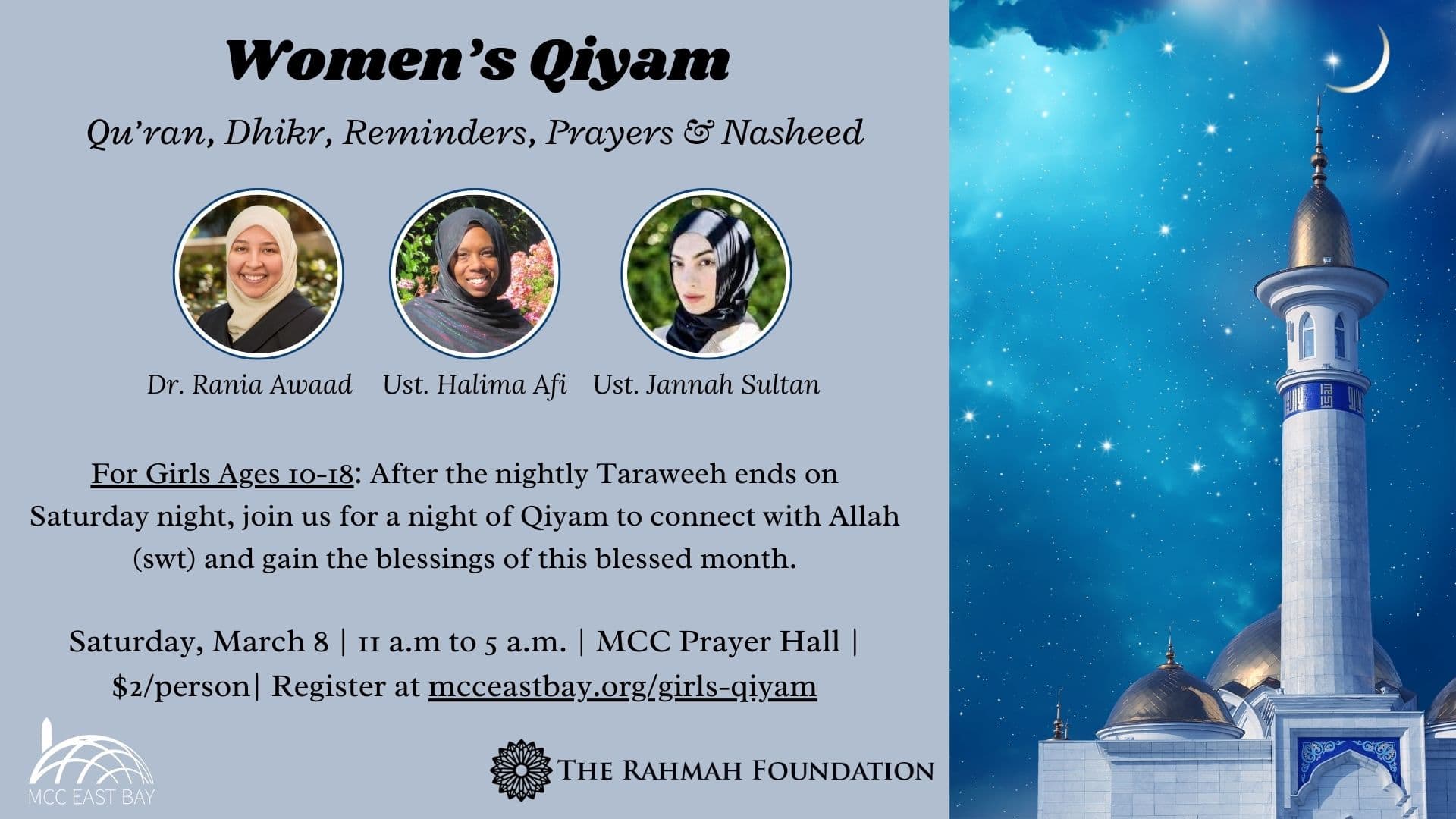For Women & Girls Ages 14+: Join our esteemed panel of speakers for a night of prayer, remembrance, and reminders starting after the Taraweeh prayer ends.
We will be joined by Shaykha Jannah Sultan, Ustadha Shamira Chothia Ahmed, Ustadha Dr. Rania Awaad, Ustadha Halima Afi, and Qariya Husna.
11:30 p.m. to 5 a.m. | Friday, March 8 – Saturday, March 9 | Prayer Hall & Conference Room | Free; girls and women ages 14+ | Suhoor provided at about 4 a.m. | Register for in-person at mcceastbay.org/womens-qiyam-1 | To join online, register at tinyurl.com/FridayRahmahHalaqa2
Cosponsored by The Rahmah Foundation. For female teens and women only.
- – More The Rahmah Foundation at the MCC: https://mcceastbay.org/rahmah-foundation
- – More sessions for Muslim women: https://mcceastbay.org/women
Qiyam Ul-Layl translates to “standing during the night”. And in the Islamic Tradition, the Prophet Muhammad PBUH said, “The best prayer after the obligatory prayers is the night prayer.” (Sahih Muslim)
About the Speakers:
Shaykha Jannah Sultan
Hailing from California, Shaykha Jannah Sultan holds a bachelor’s in biology and nutrition. Her dedication to holistic healing parallels her deep commitment to Islamic studies. Her Islamic academic journey began at the acclaimed Jamia Binoria, followed by an intense decade of Islamic Studies with distinguished mentors, notably Shaykh AbdulNasir Jangda. As a resident scholar and director of sisters’ guidance at Al-Misabaah, Shaykha Jannah’s influence reverberates throughout the Sacramento area and North America.
Ustadha Shamira Chothia Ahmed
Born and raised in California’s Central Valley, Shamira Chothia Ahmed is passionate about educating and empowering Muslim women to reach their highest spiritual potential through acquiring sacred knowledge.
Having graduated as valedictorian from a large public high school, her studies led her — following a brief soul-searching stint at Georgetown University — to seek sacred knowledge from scholars on three continents — Africa, Europe, and Asia.
Ustadha Shamira began her journey in seeking sacred knowledge at the women’s Dar-ul-Uloom Mu’eenal Islam seminary in South Africa and completed the five-year intensive ‘Alima programs at Ja’mia Al-Imam Muhammad Zakariyya, one of Britain’s first and most renowned Islamic universities for women. Thereafter, she continued her Arabic and Qur’anic studies in Damascus, Syria, where she obtained an ijāzah in Tajwīd of the Ḥafṣ recitation from the late eminent Syrian scholar Shaykh Ḥasan al-Kurdī.
In 2005, Ustadha Shamira taught Hanafi fiqh for women at the Zaytuna Institute in California and has since taught various Islamic sciences in venues across North America. In 2008, she earned a Master’s Degree in Demographics and Social Analysis from the University of California at Irvine, focusing on the identity formation of the Muslim-American population.
In 2013, Ustadha Shamira specialized in the detailed rulings of menstruation, lochia, and abnormal discharge under the direction of Mufti Abdur Rahman Ibn Yusuf Mangera and assisted in compiling Imam Abu Hanifa’s Al-Fiqh al-Akbar Explained.
Shamira is a wife and mother of five children. She is passionate about empowering women in their childbearing years to gain closeness to their Lord through her spiritual birth consultations and virtual doula services.
Ustadha Shamira is a co-founder of the Rahmah Foundation and currently teaches for Nur al-Iman, a full-time girls’ shariah program with Ustadha Mona Elzankaly based in the Bay Area.
Ustadha Dr. Rania Awaad
Shaykah Dr. Rania Awaad M.D. is a Clinical Professor of Psychiatry at the Stanford University School of Medicine, where she is the Director of the Stanford Muslim Mental Health & Islamic Psychology Lab as well as Stanford University’s Affiliate Chaplain and Affiliate Professor of Islamic Studies. In the community, she serves as the President and Co-Founder of Maristan, a holistic mental health nonprofit serving Muslim communities, and the Director of The Rahmah Foundation, a non-profit organization dedicated to educating Muslim women and girls. Before studying medicine, she pursued classical Islamic studies in Damascus, Syria, and holds certifications (ijaza) in the Qur’an, Islamic Law, and other branches of the Islamic Sciences. Follow her @Dr.RaniaAwaaid
– More from Dr. Rania: http://mcceastbay.org/rania
– More Dr. Rania’s Friday Evening Halaqas: http://www.mcceastbay.org/womens-halaqa
About Halima Afi



